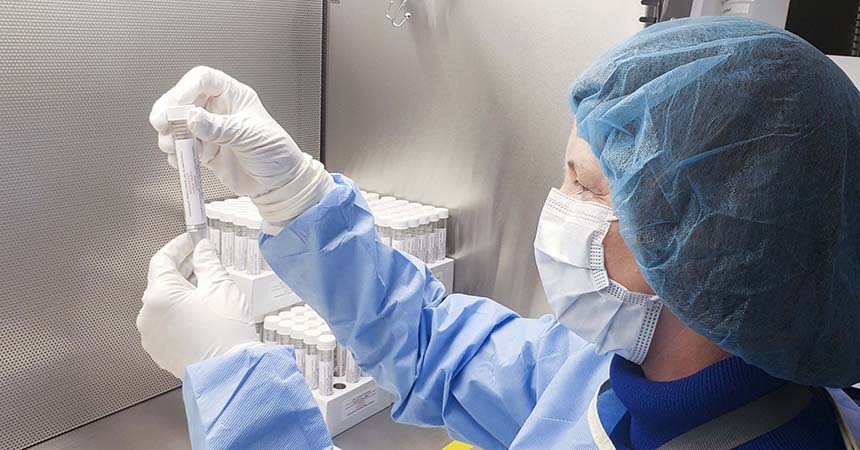College of Pharmacy at HSC making solution for COVID-19 testing kits
By Diane Smith
COVID-19 has moved across the globe depleting communities of resources needed to fight its spread – from masks to drugs to the solution used in testing kits to transport specimens to laboratories.
But now, a team of experts at The University of North Texas Health Science Center at Fort Worth, has stepped in to help.
Michail Kastellorizios, PhD, Assistant Professor of Pharmaceutical Sciences, is leading the manufacturing of Viral Transport Media (VTM) for Tarrant County Public Health. The solution is an essential component for COVID-19 testing.
“This is in response to shortages people are seeing across the country,” said Dr. Kastellorizios, who teaches in the College of Pharmacy’s Department of Pharmaceutical Sciences. “The testing has to go on.”
On April 24, the team made 350 VTM tubes in a span of a few hours at the Sterile Compounding Lab located at the Interdisciplinary Research and Education Building (IREB) on the HSC campus.
“Tarrant County Public Health Department contacted us, and said they are concerned about shortages. They are not out yet, but they are concerned that they might run out,” Dr. Kastellorizios said.
The team is working to manufacture a total of 1,600 vials that the county can use as backup.
“We can probably scale that to 3,000 if necessary – thanks to our College’s donation of materials and supplies,” he said, adding that their efforts can also be used to help with COVID-19 testing that is underway through collaborations between HSC, the City of Fort Worth, Tarrant County Public Health and UT Southwestern’s Moncrief Cancer Institute.
When a person is tested for COVID-19, a swab is used to collect a specimen from a person’s nose. That specimen is placed in a tube filled with VTM and taken to a lab for testing, Dr. Kastellorizios said.
“They take that swab and put it in this tube and close it up,” he said. “The virus, if it exists, will be preserved for testing in this media that we make – the VTM.”
The team made the solution based on a protocol published by the Centers for Disease Control and Prevention in response to shortages caused by the COVID-19 pandemic, Dr. Kastellorizios said. He said it is a relatively simple formula that can be made with appropriate protocols in place.
“We followed the CDC protocol that includes a two-day sterility test for each batch, and we tested additional vials at random,” he said. “You need to make sure it is sterile and the composition is right.”
The teamwork was taking place at an almost empty campus as social distancing continued through the spring semester.
“It feels good to be useful,” Dr. Kastellorizios said. “Our research labs have been closed because of the pandemic. We are enjoying being back in the lab and doing something to help our community.”
Donna Coyle, MS CCRP, Director of Research at the College of Pharmacy, said the work is fulfilling. Before coming into the lab, she had been juggling her work from home. She welcomed work to help the community.
“This feels like being able to contribute a little bit more,” Coyle said.
Theresa Day, RCPhT, PRS and the Pharmacy Technician in charge of the PharmD Skills Labs, said she had been working on moving classes that take place in the lab to an online platform when this opportunity came up.
“I was all in when I found out we were going to do this,” she said.
Ina Mishra, PhD, Postdoctoral Research Associate in the Kastellorizios Lab, said the effort puts to use valuable resources.
“If all pharmacy schools do something like this, it can prevent shortages in the future,” she said. “I’m pretty proud of it.”




![Uyen Sa Nguyen Scaled[58]](https://www.unthsc.edu/newsroom/wp-content/uploads/sites/16/Uyen-Sa-Nguyen-scaled58-145x175.jpg)

Social media